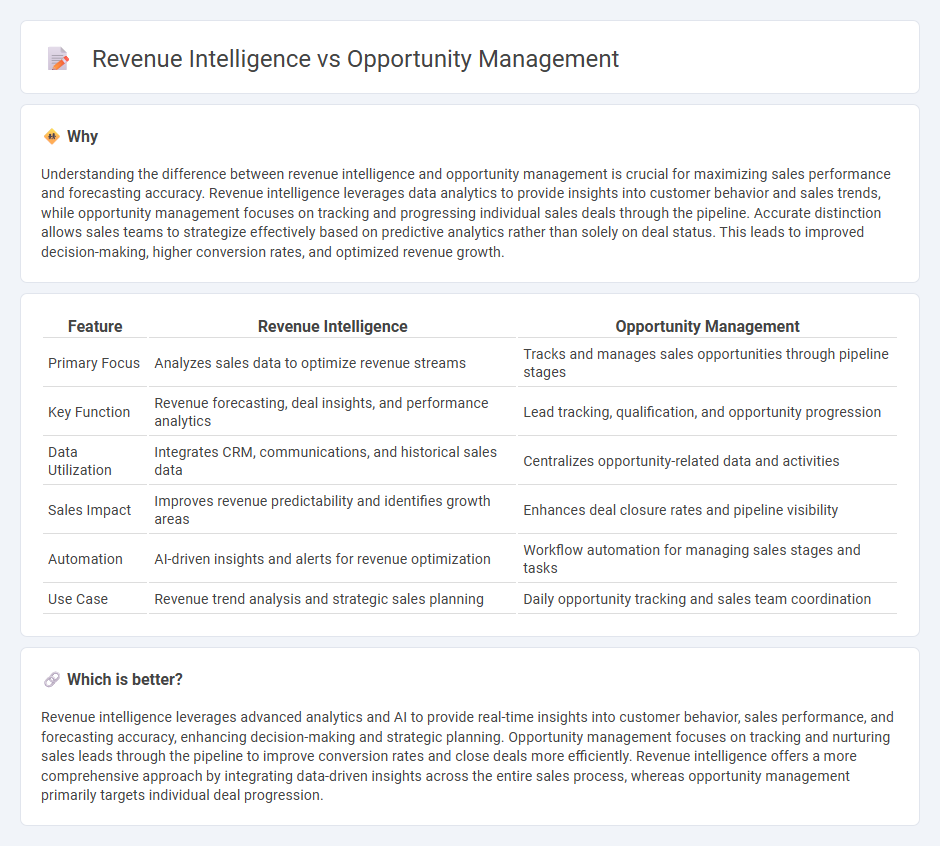
Revenue intelligence captures actionable insights from customer interactions using advanced analytics and AI to optimize sales strategies and forecast outcomes. Opportunity management tracks and organizes potential sales deals through stages, ensuring effective pipeline management and prioritization. Explore how integrating both approaches can accelerate your sales performance and drive higher revenue growth.
Why it is important
Understanding the difference between revenue intelligence and opportunity management is crucial for maximizing sales performance and forecasting accuracy. Revenue intelligence leverages data analytics to provide insights into customer behavior and sales trends, while opportunity management focuses on tracking and progressing individual sales deals through the pipeline. Accurate distinction allows sales teams to strategize effectively based on predictive analytics rather than solely on deal status. This leads to improved decision-making, higher conversion rates, and optimized revenue growth.
Comparison Table
| Feature | Revenue Intelligence | Opportunity Management |
|---|---|---|
| Primary Focus | Analyzes sales data to optimize revenue streams | Tracks and manages sales opportunities through pipeline stages |
| Key Function | Revenue forecasting, deal insights, and performance analytics | Lead tracking, qualification, and opportunity progression |
| Data Utilization | Integrates CRM, communications, and historical sales data | Centralizes opportunity-related data and activities |
| Sales Impact | Improves revenue predictability and identifies growth areas | Enhances deal closure rates and pipeline visibility |
| Automation | AI-driven insights and alerts for revenue optimization | Workflow automation for managing sales stages and tasks |
| Use Case | Revenue trend analysis and strategic sales planning | Daily opportunity tracking and sales team coordination |
Which is better?
Revenue intelligence leverages advanced analytics and AI to provide real-time insights into customer behavior, sales performance, and forecasting accuracy, enhancing decision-making and strategic planning. Opportunity management focuses on tracking and nurturing sales leads through the pipeline to improve conversion rates and close deals more efficiently. Revenue intelligence offers a more comprehensive approach by integrating data-driven insights across the entire sales process, whereas opportunity management primarily targets individual deal progression.
Connection
Revenue intelligence integrates data analytics, CRM insights, and buyer behavior to enhance opportunity management by identifying high-value prospects and predicting deal outcomes. Opportunity management leverages these insights to prioritize sales efforts, optimize pipeline stages, and improve forecast accuracy. This connection drives smarter decision-making, accelerates sales cycles, and maximizes revenue growth potential.
Key Terms
**Opportunity Management:**
Opportunity management centers on tracking and prioritizing sales leads to maximize deal closure rates and streamline the sales pipeline. This process involves data-driven insights into customer interactions, forecast accuracy, and resource allocation to identify the highest-value opportunities. Explore how opportunity management can transform your sales strategy and boost revenue predictability.
Pipeline
Opportunity management emphasizes tracking and advancing sales deals through defined stages in the pipeline to improve forecasting accuracy and deal closure rates. Revenue intelligence leverages AI and data analytics to provide deeper insights into pipeline health, buyer behavior, and sales performance, enabling proactive decision-making. Discover how integrating opportunity management with revenue intelligence enhances pipeline visibility and drives revenue growth.
Qualification
Opportunity management centers on tracking and nurturing sales prospects to ensure they advance through the pipeline effectively, emphasizing qualification criteria such as budget, authority, need, and timeline (BANT). Revenue intelligence leverages AI-driven analytics to unearth deeper insights from sales interactions, enhancing qualification accuracy by identifying signals and patterns that predict deal success. Explore how integrating opportunity management with revenue intelligence can transform your sales qualification process and boost conversion rates.
Source and External Links
Opportunity Management | www.dau.edu - Opportunity management is a structured process to identify, analyze, manage, and monitor potential opportunities that can improve program cost, schedule, or performance, using a five-step process including planning, identification, analysis, management, and monitoring.
What is Opportunity Management (OM)? - DealHub - Opportunity management in sales focuses on tracking, managing, and optimizing sales opportunities throughout their lifecycle to increase deal closures by understanding the sales pipeline, setting responsibilities, and leveraging data-driven insights.
Opportunity Management: Complete Guide - Effective opportunity management in sales involves systematic pipeline analysis, clear role assignments, automation for task tracking, and continuous data-driven refinement to efficiently close more deals and grow business.
 dowidth.com
dowidth.com